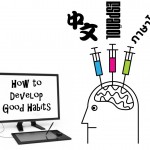 There is much to suggest that the ethos of social business is underpinned by the behaviours of each employee in the organisation. These behaviours, viewed collectively form the culture of the enterprise, which in turn goes a long way to determining whether it is in fact a social business.
There is much to suggest that the ethos of social business is underpinned by the behaviours of each employee in the organisation. These behaviours, viewed collectively form the culture of the enterprise, which in turn goes a long way to determining whether it is in fact a social business.
Therefore, the issue of how one picks up good habits should be of great interest to all involved in the social business movement. New research from the Georgetown University Center for Brain Plasticity and Recovery set out to explore the role mindfulness played in our ability to form habits. Mindfulness in this context was defined as the state of being aware of ones surroundings.
Participants in the study were tested for their level of mindfulness, before then being asked to complete one of two implicit learning tasks. The tasks involved watching a series of dots on a computer screen, and then responding when a certain coloured dot appeared in a particular part of the screen. What the participants didn’t know was that the tasks were rigged so that a green dot would always appear two beats after the red dot. If they managed to pick up on this hidden trend, they would react faster and it would be an indication of their implicit learning.
When compared with the tests for mindfulness from earlier, the scores revealed that those who were less mindful learned faster. So in other words, if the participants were less actively engaged, they were better able to absorb the lesson from the test.
“The very fact of paying too much attention or being too aware of stimuli coming up in these tests might actually inhibit implicit learning,” the researchers said. “That suggests that mindfulness may help prevent formation of automatic habits — which is done through implicit learning — because a mindful person is aware of what they are doing.”
These are interesting findings given the intense amount of stimulus many of us are exposed to every day at work. Whether it’s the hubub of open plan offices or the frequent interruptions as emails enter our inbox, the modern workplace is awash with information fighting for our attention. Such sensual overload may, this study suggests, be very damaging for our efforts to pick up the kind of habits we as managers strive for.
Of course, implicit learning is not the only form of learning, with another study from earlier this year showing that high levels of mindfulness were actually helpful when it came to explicit learning. So when we’re actively engaged in learning, it appears to be a useful quality to have, but when we are trying to learn in more subtle ways, maybe not.